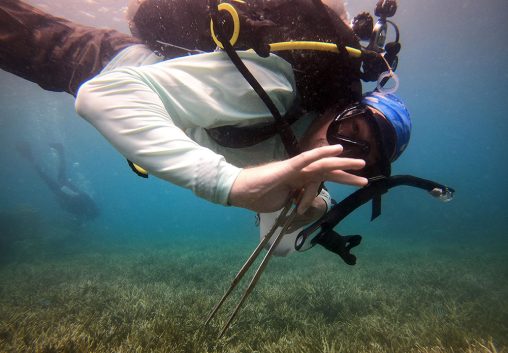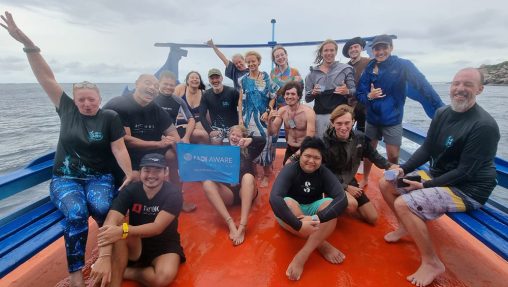
Josh Hivner, a senior biological sciences major at Wright State, helped clear debris from coral reefs while gathering data for his undergraduate thesis during a trip to Thailand.
Josh Hivner, a senior biological sciences major in Wright State University’s College of Science and Mathematics, spent seven weeks last spring in Thailand studying coral reefs at his own expense.
The data he compiled and continues to analyze will be the basis of his undergraduate thesis, which looks at the health not only of the coral reefs but also the planet.
“Conservation biology inspires me,” said the Huber Heights native. “It’s important that we take care of what we have here on Earth.”
He did field research in Florida last year and wanted to build on that experience. So why Thailand?
“I got interested in the effect of global warming on corals and wanted to do research and was looking where to go,” he said. “I found an organization in Thailand, The Coral Tribe.”
Hivner applied for a grant, didn’t get one, but decided to pursue the research on his own.
He was in Thailand from April 30 to June 19, joining The Coral Tribe in dives to the coral reefs off the island of Koh Tao to clear away plastics, fishing nets and lines that littered the reefs. He also gathered data on the reefs’ health and related marine activity, including giant clams.
“We looked at how the abundance of giant clams correlates with coral health,” Hivner said. “Do coral reefs have more resilience if there are more giant clams? We’re studying that relationship.”
When he returned to campus this semester, Hivner dived into scholarly research and is compiling the data. He hopes to find some significance in the data and do a more in-depth and targeted project about coral health. His goal is to find ways to protect the health of coral reefs.
Coral health is important to oceanic health, something that is of greater worldwide concern.
“The oceans are very important to regulating climate on Earth,” Hivner said. “They’re our buffer for all the things that we’re doing to harm the environment with carbon emissions. There will come a point when things are going to get worse quickly.”
After graduating with his bachelor’s degree next spring, he plans to look into graduate school.
“I’d like to broaden my experience a little more and continue research through marine biology or biological sciences,” he said.

Josh Hivner joined The Coral Tribe in dives to the coral reefs off the island of Koh Tao to clear away plastics, fishing nets and lines that littered the reefs.
Another option he is considering is joining The Coral Tribe team full-time.
“The people of The Coral Tribe made the whole experience,” he said. “I was going almost exactly on the opposite side of the world from Dayton. I had no idea what was going to happen. But they brought me in. It wasn’t awkward. I was part of a family.”
Hivner said it was a rewarding experience because everyone was passionate about the same thing.
“No matter what they were doing, either diving or data entry. We felt we were making a difference,” he said.
Hivner said Wright State’s professors and staff have helped him on his marine journey.
“Everyone is very enthusiastic and willing to help,” he said.
He singled out Volker Bahn, Ph.D., associate professor of biological sciences, the advisor for his undergraduate thesis, for his help.
“Everyone’s been accommodating for me,” Hivner said.

 Wright State alum Lindsay Aitchison fulfills childhood space-agency dream
Wright State alum Lindsay Aitchison fulfills childhood space-agency dream  Wright State business professor, alumnus honored by regional technology organizations
Wright State business professor, alumnus honored by regional technology organizations  Wright State University Foundation awards 11 Students First Fund projects
Wright State University Foundation awards 11 Students First Fund projects  Gov. DeWine reappoints Board Treasurer Beth Ferris and names student Ella Vaught to Wright State Board of Trustees
Gov. DeWine reappoints Board Treasurer Beth Ferris and names student Ella Vaught to Wright State Board of Trustees  Joe Gruenberg’s 40-Year support for Wright State celebrated with Honorary Alumnus Award
Joe Gruenberg’s 40-Year support for Wright State celebrated with Honorary Alumnus Award 